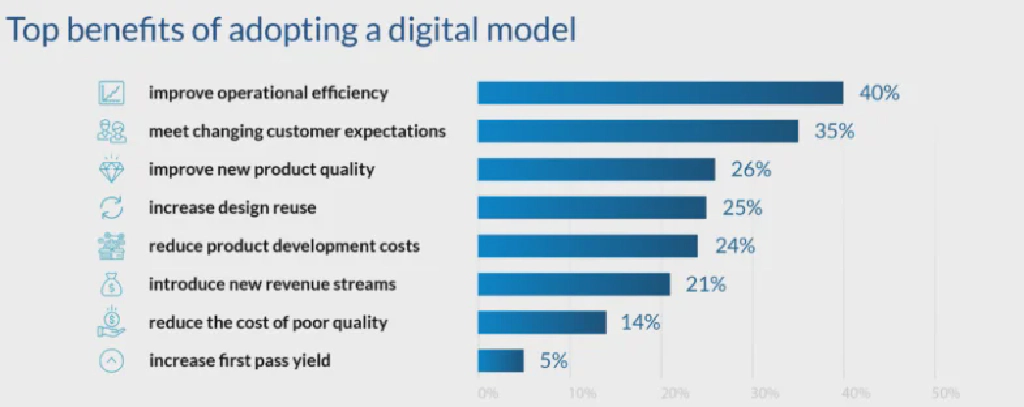Small business owners like you are facing a pivotal moment – move into the digital future or be left behind.
Wondering if digital transformation is just buzzwords or a real game-changer? Unsure about its benefits for your company? Don’t worry, we have got the answers you seek.
We created this article to provide you with a brief overview of digital transformation and its benefits for your small business.
Next time, we will discuss certain steps you should take to make your digital transformation happen. Stay tuned.
Ready to embark on your digital transformation journey? Let’s start now!
What is Digital Transformation?
Digital transformation implies the active usage of innovative technologies in all business areas. It focuses on modernizing outdated operational processes and workflows and delivering new value to customers.
To achieve successful digital transformation, your organization should foster a culture of constant experimentation and accept failure as an essential part of the process.
By doing so, you will ignite innovation, boost growth, and establish your company as an industry leader, ensuring lasting prosperity and flexibility.
Digitalization vs Digital Transformation
These two concepts may seem similar at first, but there is more to them than meets the eye. Let’s find out what sets these notions apart.
- Scope. Digitalization affects specific processes, while digital transformation strives to reshape the entire organization.
- Objectives. Digitalization is about improving operational efficiency and productivity. At the same time, digital transformation uncovers hidden opportunities and brings added value.
- Impact. Digitalization fosters gradual advancements, while digital transformation catalyzes broad-scale organizational shifts.
To sum up, digitalization optimizes existing operations and workflows. Digital transformation, in turn, redefines small businesses, helping them thrive in the digital era.
Benefits of Digital Transformation for Small Business
FinancesOnline, a leading software evaluation platform, has recently shared the latest digital transformation statistics. This research also highlighted the following benefits of using advanced technologies:

Let’s discuss each of these advantages in more detail:
Improved Operational Efficiency
Streamlined Workflows
With cutting-edge technologies, you can speed up manual workflows, automate mundane tasks, and access data swiftly. This modernization improves efficiency and productivity, enabling employees to focus on their pivotal duties.
Data-driven Insights
By leveraging data analytics, you can get real-time insights into business operations. Consequently, you can uncover inefficiencies, optimize processes, and drive continuous improvement.
Enhanced Collaboration and Scalability
Moving to the cloud can enhance accessibility, collaboration, and scalability. Cloud technologies eliminate the need for expensive on-premises infrastructure and enable remote work, boosting operational agility.
Meeting Changing Customer Expectations
Deep Customer Insights
Digital transformation gives you access to customer data and analytics. With its help, you can understand better changing consumer preferences, behaviors, and pain points.
Consequently, you can tailor products, services, and marketing to meet the unique needs of each consumer.
Enhanced Customer Engagement
Social platforms, email campaigns, and community forums foster ongoing conversations and customer involvement. Active usage of these channels can help you build stronger relationships and encourage brand loyalty.
Consistent Omnichannel Experience
By integrating different channels like websites, social media, and online marketplaces, you can create a cohesive and consistent brand experience across touchpoints.
This omnichannel approach enables you to meet customers where they are and provide a unified experience.
Improved New Product Quality
Real-Time Data and Analytics
Digital technologies, like IoT sensors, can provide real-time data on product performance, quality metrics, and customer feedback.
Thus, you can use advanced analytics to detect quality issues early and improve product design through data-driven choices.
Automated Quality Assurance
With automated quality assurance processes, you can reduce human error and ensure consistent testing across product iterations. AI-powered tools can simulate, accelerate testing, and predict quality issues before they occur.
Shortened Feedback Loop
Digital transformation shortens the feedback loop between product launch and customer response. You can collect feedback swiftly, review it, and make necessary changes to boost product quality from real-world insights.
Ready to enhance your product quality with cutting-edge technology? Partner with us to drive innovation, improve customer experiences, and enhance your product quality through digital transformation.
Increased Design Reuse
Centralized Design Repository
Create a centralized, cloud-based design repository that stores all product designs, CAD models, and related data. This solution provides engineers with a single source of truth, making it easier to discover, access, and reuse existing designs.
Generative Design Software
Another helpful digital solution for your small business is generative design software. It uses AI algorithms to automatically generate design alternatives based on specified parameters, constraints, and performance objectives. This system speeds up the design process and promotes the reuse of optimized design concepts.
Cloud-Based Design Platforms
Finally, your organization will benefit from cloud-based design platforms. Such systems facilitate real-time collaboration between distributed teams, enabling them to collectively build upon and refine existing designs, enhancing further reuses.
Reduced Product Development Costs
Workflow Optimization
By automating repetitive tasks with the help of digital technologies, you can optimize workflows and reduce the time required to build a new product. Consequently, the cost of a completed solution will be significantly lower.
Virtual Prototyping
You can use 3D modeling, virtual reality, and other technologies to simulate product designs and evaluate your business idea before proceeding to physical prototyping. This way, you will reduce the need for expensive physical prototypes and iterations and, consequently, optimize your expenses.
Energy-Efficient Operations
Finally, digital transformation comes with sustainable practices such as energy-efficient operations and circular product design. These initiatives not only result in cost-saving but also bring reputational benefits.
New Revenue Streams
Content Creation and Distribution
You can generate revenue through content creation and distribution strategies. More specifically, you can launch a blog or podcast or publish video content. Another option is to build digital products or SaaS solutions.
Mobile Apps and In-App Purchases
You can also create a mobile app and adopt an in-app purchase model to diversify revenue streams and capitalize on the thriving mobile market.
Data-Derived Knowledge and Statistical Exploration
You can offer your customers and partners data-driven insights and analytics services and thus monetize your data assets.
Reduced cost of poor-quality
Proactive Quality Monitoring
Digital technologies simplify proactive quality monitoring. You get helpful tools for proactive monitoring, control, and quality improvements. You can also gain insights into quality metrics through automated alerts, dashboards, and comprehensive reporting.
As a result, Faster problem-solving and preventive actions help you minimize quality-related costs.
Enhanced Supplier Collaboration
Digital platforms facilitate better collaboration with suppliers and partners. Shared quality data, performance tracking, and automated alerts help identify quality issues earlier in the supply chain.
Consequently, this proactive supplier management reduces the risk of poor-quality materials or components.
Increased First Pass Yield (FPY)
Real-Time Process Visibility
Integrating the Industrial Internet of Things (IIoT), cloud computing, and advanced analytics can offer you real-time visibility into your processes. This transparency leads to better process control, predictive maintenance, and automated adjustments to improve FPY.
Efficient Data Management
Additionally, Manufacturing Execution Systems (MES) and automated data loading can streamline data management, improve traceability, and ensure the accuracy of FPY calculations.
This way, you can make data-driven decisions to continuously improve processes.
Critical Areas of Digital Transformation
To drive growth and stay competitive in the fast-evolving digital era, you need to prioritize the critical areas of digital transformation. We recommend that you start with the following operational activities:
Marketing and Sales

Digital Marketing Strategies
Consider implementing digital marketing strategies to attract new customers and retain existing ones, improve lead generation, and raise the conversion rate. The most effective digital marketing efforts are SEO, content marketing, PPC advertising, social media marketing, and affiliate marketing.
Performance Tracking Tools
Use specific tools such as Google Analytics, Ahrefs, or Hotjar to track the performance of marketing campaigns and sales activities more accurately. They will empower you to measure the effectiveness of your marketing efforts.
Enhanced Team Collaboration
Finally, you can utilize digital tools to foster better collaboration between marketing and sales teams, ensuring alignment and improving overall performance.
Financial Management
Enhanced Insights with Big Data and AI
With the help of big data, artificial intelligence, and predictive analytics, you can gain better insights into your financial performance. Comprehensive data analysis and market forecasting allow you to manage risks more efficiently and make more informed decisions.
Automation of Financial Tasks
Digital tools can automate repetitive financial tasks like accounts payable/receivable, payroll, and reconciliations.
Consequently, manual effort is reduced, and costly mistakes, which may have negative consequences for your business, are minimized.
Operations and Workflow Automation

Minimized Human Errors and Delays
The automation of repetitive, manual tasks minimizes human errors and delays. All your workflows are streamlined and resource allocation is optimized.
As a result, you can accomplish more with less effort.
Enhanced Accuracy and Consistency
By removing the human element, you can achieve high accuracy and consistency in executing tasks and processing data. This approach reduces the need for rework and prevents compliance issues.
Data Management and Security

Robust Cybersecurity Measures
As your business grows, your corporate data volumes will steadily increase. Given that, cybersecurity becomes your top priority. You need to implement robust security measures to safeguard your sensitive information.
The most common procedures include:
- Regular vulnerability scanning;
- Encryption;
- Security monitoring and incident response.
Two-Factor Authentication
Two-factor authentication can prevent unauthorized access to accounts and systems. As a result, you will avoid data breaches, account takeovers, and other cyber threats.
Compliance with Industry Regulations
It is important to maintain compliance with industry regulations and standards such as HIPAA, PCI DSS, and GDPR. Otherwise, you may face hefty fines, penalties, and potential legal consequences.
Conclusion
In this blog post, we explored the ins and outs of digital transformation and covered its primary advantages that can optimize your small business.
Next time, we will guide you through the crucial steps for a successful digital transformation. Stay tuned.
At Apicula, we help small businesses navigate their digital transformation journey with confidence and ease. Contact us to start your technology upgrade.




